Best Synthetic Clarinet Reeds of 2021, Review and Ranking
- Clarinet U Article
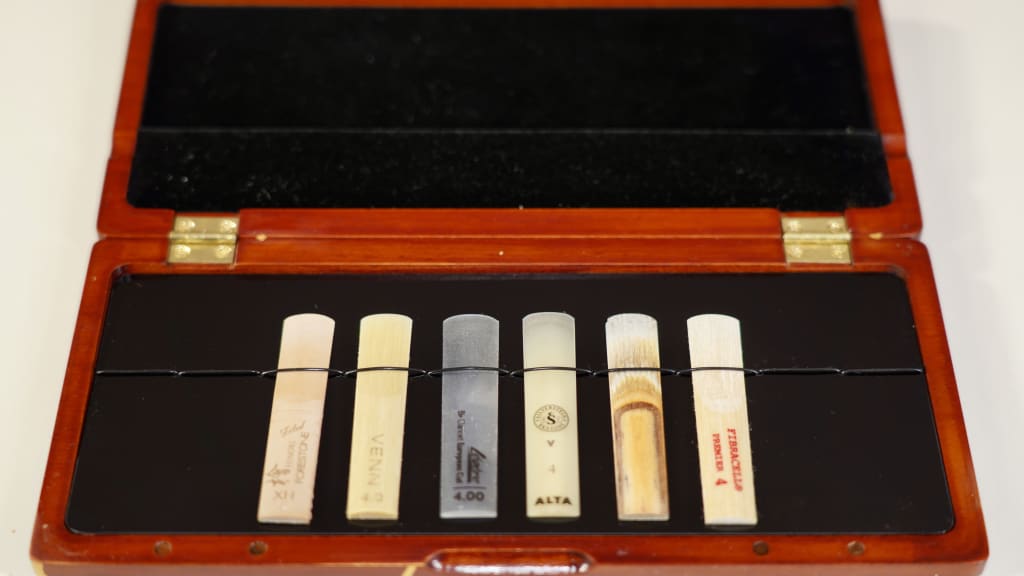
Choosing a good clarinet reed is hard, especially when you are finding the right one for a concert or performance. The traditional cane reed does offer a good sound, however, it takes time and effort to select a good reed to play, and it does cost a lot of money and care.
That's when synthetic reed comes to play. Synthetic reed is an innovation that evolved from the traditional cane reed. With the main goal of producing superior clarinet sound with human synthetic materials and technology.
The earliest usage of synthetic reeds was from World War II when there was a shortage of reeds from France, musicians would use styrene to make reeds. In modern days, many companies invented new ways of making synthetic reeds, by using heavy machinery, new materials, and secret recipes.
Synthetic reeds used to be made with epoxy resins, molded plastics, styrene, and polyester. Which they can not produce the sound that cane reed does, the sound of wooden timber. Companies today have experimented and tried several ways of improving the production of these synthetic reed, that in my opinion, have reached superior sound than the traditional cane reed.
In this article, I have reviewed ranked the top synthetic clarinet reeds that are available on market in 2021. Currently, there are six synthetic reeds in the market that have promising reviews and feedback from customers. The companies are Legere, Silverstein, D'addario, Forestone, Fibracell, Fiberreed.
In the review test, we've selected the most popular reed mode from each of the companies. All reeds are around #4 hardness and played with Vienna Woodwinds Gleichweit Mouthpiece #8 and #9.5. Using Backun Model F Grenadilla Clarinet, and Buffet Tosca Grenadilla Clarinet.
"The test lasted four weeks, and I liked both reeds very much in terms of their sound and their versatility. I've conducted tests such as playing the reed different genres, octave response, hardness and softness, tonguing, sliding and pitch dropping, sound, quality, taste/comfort, price value, altissimo, low notes, dynamic control, material."
We also recommend you to check out each company's reed comparison chart before you make a purchase. You can find it on their official website.
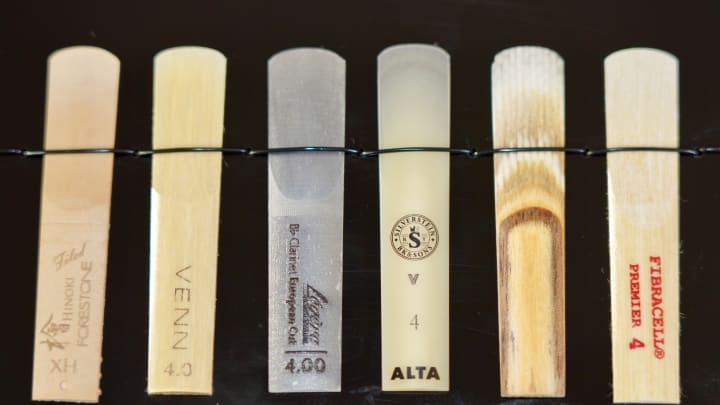
6) Fibracell (Strength 4.0) ($16.50)
Fibracell reed is a cheap synthetic reed, it is one of the earliest synthetic reed company and that is still mass producing its reed. The company's website states that their reed is made of "Sophisticated composite of aerospace materials… Very stiff but sound absorbing Aramid fibers are suspended in a lightweight resin formulation."
My first impression of the reed is that the reed is definitely in a soft side, which makes the sound very bright and easy to produce the sound. Also, it being a soft reed allows me to play everything easily but slightly hard to concentrate the sound.
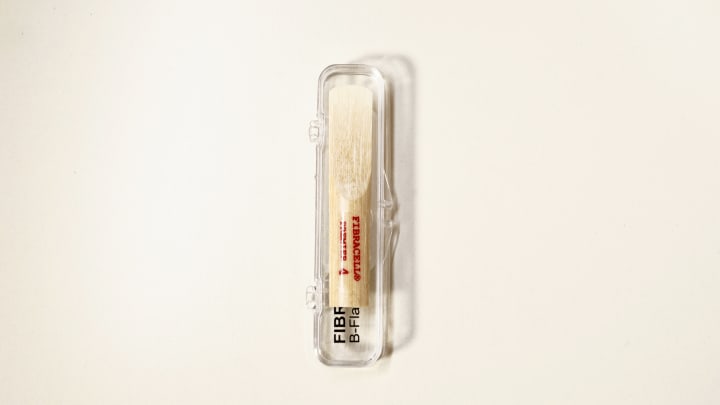
Pros:
- Cheap solution of synthetic reed, affordable price.
- The front surface of the reed feels very much like a cane reed, right amount of friction.
- Quick action and sounds very bright and fluent, also can produce quick tonguing response.
- Great for jazz music or popular music.
Cons:
- It has some fiber sticking out on the side of the reed.
- Despite of it being a strength 4 reed, it sounds and plays like a strength 3, very soft sounding.
- Upper register lost its focus of sound, the pitch can be easily bent.
---
5) Fiberreed Hemp (Strength Hard) ($31.95)
Fiberreed Hemp model has a very interesting look, which will definitely attract new customers. Fiberreed company also experimented with many organic and synthetic materials to make new reed models. On the company's website states that "Hemp reed has superior hollow fiber layered with hemp fiber & crowned with layers of hardwood."
My first impression of the reed is that it has a very interesting feel in the mouth. Which is like a wet piece of paper. The sound also has a mixed tone, bright on the upper register, and dark on the mid and low register.
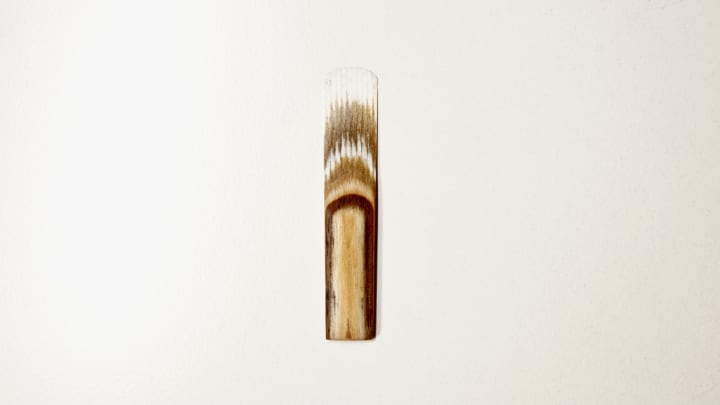
Pros:
- Very attractive looking design, the pattern between hemp and hardwood fiber is soothing to look at.
- Dark sounding in the mid and low register.
- Very versatile, good dynamic response and sounds great in jazz or classical music.
Cons:
- Chip easily, and the chip part will hurt your lips (experienced myself), and need to be careful with the tip, because if can be sharp.
- The upper and altissimo range sounds light and lost the focus of the sound.
---
4) Forestone Hinoki (Strength XH) ($28.95)
Forestone is a company that is based in Japan, and they have produced a revolutionary hybrid reed, which is "Polypropylene resin and cellulose wood fiber. More than 50% of the wood fiber used is bamboo." The Hinoki reed has a very interesting look, which the front side is mimic and feels like a cane reed, but the backside is smooth and like a synthetic reed.
My first impression of the reed is that it does sound like a cane reed, and it has the right amount of resistance. The front side also feel like a cane reed with a cane friction feeling. The sound is very well but feels slightly muted and not as bright as others.
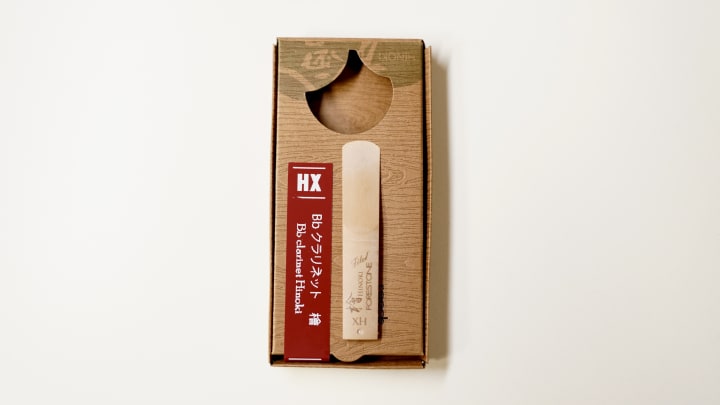
Pros:
- Great front reed surface texture, it feels like the surface of a bamboo, and very comfortable on the lip.
- It has a slightly light tone and can be lyrical.
- Well made with no visible fiber nor rough spot.
- Great altissimo respond, easy to hit the high notes
- Well balanced to play both classical and jazz music.
Cons:
The tip of the reed is not 100% symmetric, which looks like hand-cut, it doesn't affect the sound that much, but it might create an unbalanced resonance.
It doesn't project the sound as loud in the lower register, because of its resistance and tone.
---
3) D'Addario Venn (Strength 4.0) (27.99)
D'Addario reed is famous for its quality and has a promising sound. The company says "We reverse-engineered cane itself, layering polymer fibers with resin and reed particles to make the blank." The company pushes their engineers to find a new solution to the reeds and the result is quite fascinating. On their website they did a frequency output comparison between their original cane reed and Venn reed, the result is almost overlapping.
My first impression of the Venn is it has a very clean look, with a beautiful reed color to it. It also feels very glassy and polished. With strength 4, it is on the hard-side compare to others, but a simple change of mouthpiece solved the problem.
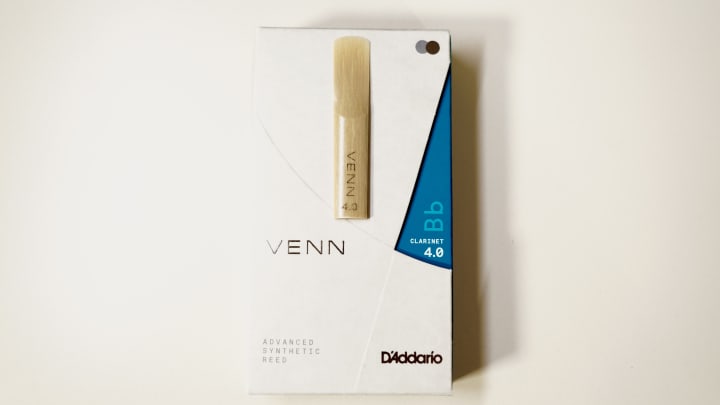
Pros:
- The tone is slightly muted, but sounds very good regardless.
- The lower register has a good sound and harmony.
- Being a new developed reed has a great potential for improvement as for the sound.
Cons:
- Over packaged, the box has several layers which is not necessary for a single reed.
- Upper register sound is less focused than the lower, which needs time to get used to.
---
2) Silverstein Alta Vivace Cut (Strength 4.0) ($39.00)
Silverstein recently put out their newest innovation of Alta Vivace Cut synthetic reed. It is made with a new reed material called Ambipolymer, and the company claim that it is "the world's first symphonic material, invented just for reeds…made with precision double injection molding process." By the writings on their website, I believe Silverstein is pushing this new line of reeds to the musicians. Its innovation and design is very intriguing to test and play.
My first impression of Alta Vivace Cut is its futuristic designed packaging and reed. The half-transparent reed is very satisfying to look at, and the reed feels very comfortable on the lip.
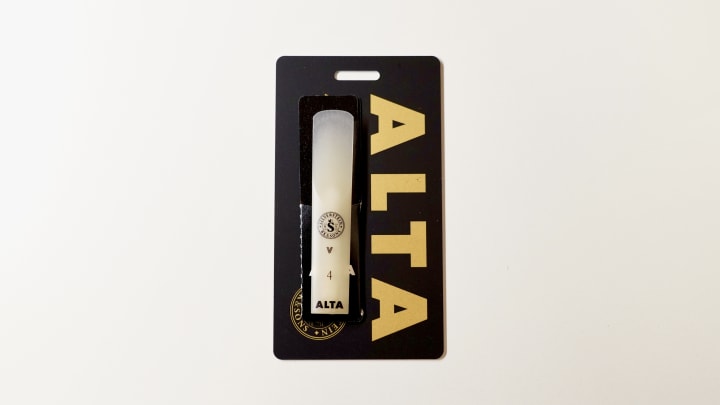
Pros:
- Very nice packaging, love the feel and the unbox process. It even has a little card that can mark your name, and a small card for teaching you have to prepare the reed.
- It can be a great reed if you take time to get used to the stiffness, it does give out a good and lyrical sounding.
- Altissimo range is good and projected.
- It can be a good practice reed for training your embrasure muscle.
Cons:
- Very expensive, most expensive synthetic reed.
- Strong resistance and not easy to make a loud sound, requires lots of air to vibrate.
- Hard to make a clean tonguing, and the tonguing sounds heavy and muffled.
---
1) Legere European Signature (Strength 4.0) ($30.99)
Legere reed is the leading company in producing the best synthetic clarinet reed, its reeds are being played by many world's famous clarinetists. Legere reed "Uses polypropylene to make both single and double reeds. Polypropylene is a common, non-toxic polymer with applications in food containers, packaging, rugs, and many other products… To make the plastic much stiffer Légère puts it through a process called orientation. This is the secret to creating Légère reeds."
My first impression of the European Signature is the feeling of fullness. It is very versatile in all registers, and it is very comfortable to play without resistance. It also has a very resonance lower register which makes the clarinet sound louder than the rest.
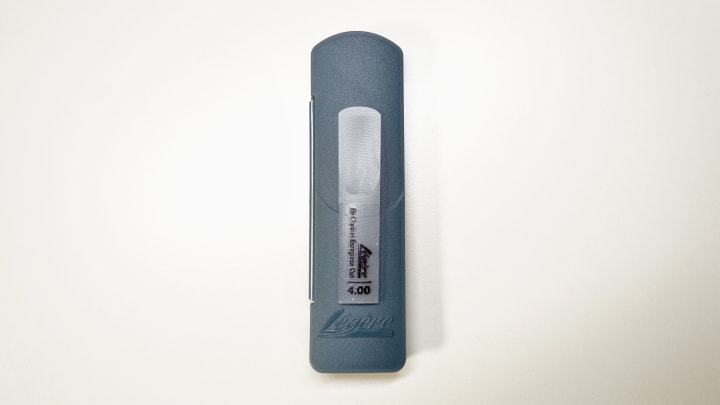
Pros:
- Great sound in all register, especially the low register has a very full and rounded sound.
- The company is constantly improve its reed quality and the sound of the reed, Legere also offer reed strength exchange from their website.
- Very versatile in all music genres, its exceptional vibrating sound is great for classical music.
- Very fast response of register change and tonguing.
- Easy to control dynamics, can play both exaggerated and very soft.
Cons:
- Has some micro fiber sticking out over time.
- The tip of the reed can be as fragile as a cane reed, which will splits and bent due to accidental touch.
---
Final Ranking by personal preference:
#1 Legere
#2 Forestone
#3 Fiberreed
#4 D'Addario
#5 Silverstein
#6 Fibracell
Although these synthetic reeds are great and some are even superior to a traditional cane reed. I would still recommend playing with the traditional reed for some years then switch to synthetic reeds. Here is some advice for switching from cane reed to synthetic reeds:
- It takes a long time to get used to the reed, be patient and practice more with it.
- Do not switch back and forth between cane and synthetic, it will create discomfort to your lips and embouchure. Stay with the synthetic reed for a long period of time to get used to first.
- Even though you don't need to wet the synthetic reed, give it some moisture is always good to start the practice.
- Synthetic reed is very stable for a longer period of time, so you don't have to throw it out after few weeks of use.
- I recommend getting a few synthetic reeds and switch between them every week, the microfiber tends to heal itself in storage, and it will sometimes sound better after stored for some time.
- My review is solely based on personal trial and professional clarinetist standpoint. I recommend you to try the reeds first before you make a statement of whether you like them or not.
- Synthetic reed is also budget-friendly, its extended use time will save you lots of reed money.
- If a synthetic reed is too hard or soft, I don't recommend clipping the reed. However, switching to a smaller or larger mouthpiece can make the reed fit better.
- Be sure to check out the reed comparison chart on the company's website before purchasing the reed, since each reed company has a different standard of reed hardness.
Article written by Ye Huang
Published by Clarinet U
About Ye Huang:
Clarinetist, saxophonist, pianist, and composer. Ye performs music across classical, jazz, pop and many other genres.
He toured with world-renown musicians including Wynton Marsalis, Mike Stern, Dave Weckl, Arturo Sandoval, Eddie Daniels, and many.
About the Creator
Clarinet U
We believe Clarinet is the most beautiful instrument.
Clarinet U is an online platforms that focuses on clarinet online marketplace, lessons, and resources for all clarinetists.
www.clarinetu.com


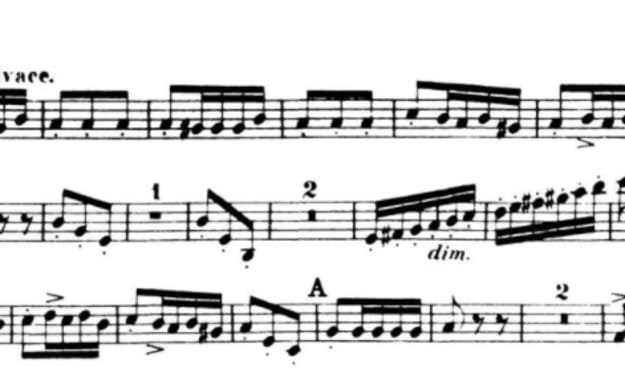



Comments
There are no comments for this story
Be the first to respond and start the conversation.